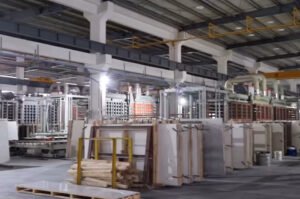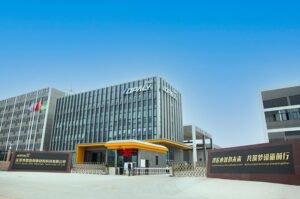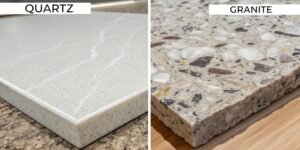Choosing the right material for a commercial project is complex. A wrong move can cause safety failures and costly delays. Understanding key certifications makes this decision much simpler.
The most crucial certifications for commercial quartz slabs are NSF 51 for food safety, GREENGUARD Gold for low chemical emissions, and CE marking for European projects. Also, look for ISO 9001 for quality management and local building code compliance, like ASTM E84 for fire resistance.

In my 13 years of exporting quartz slabs from China, I've seen how important these certifications are. They are not just pieces of paper. They are a promise of safety, quality, and durability. For a procurement manager like you, they are a guarantee that the material will meet the strict demands of your project. They also protect your investment and reputation. Let's look at what these certifications mean for you and your projects.
What is commercial-grade quartz?
You probably see the term "commercial-grade" a lot. But what does it really mean for your project's performance and budget? I can help you understand the essential difference.
Commercial-grade quartz is specifically engineered for high-traffic environments. It is non-porous, highly durable, and resistant to stains, scratches, and heat. It requires certifications like NSF to prove it can withstand the demands of public use safely and effectively.
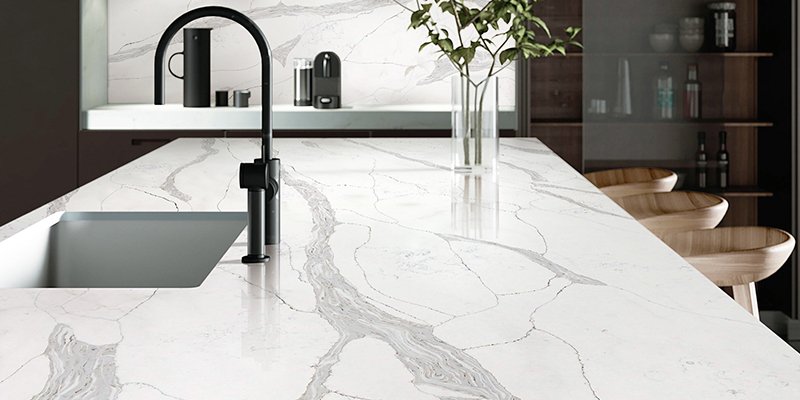
Commercial-grade is about performance under pressure. Think about a busy cafe countertop, a hotel reception desk, or a hospital's nurse station. These surfaces face constant use and abuse. They must resist coffee spills, luggage scratches, and harsh cleaning chemicals day after day. This is where commercial-grade quartz shines. It is made with a high concentration of natural quartz (typically over 90%) and high-quality polymer resins. This composition creates an incredibly dense and non-porous surface. Nothing can penetrate it, so it won't harbor bacteria. This is why it’s a top choice for healthcare and food service. Residential-grade quartz is also durable, but commercial-grade materials are often subjected to more rigorous testing to earn their place in demanding settings. As a manufacturer, we ensure our commercial line meets these higher standards.
Key Characteristics of Commercial-Grade Quartz
| Feature | Commercial-Grade Quartz | Standard Residential Quartz |
|---|---|---|
| Durability | Engineered for high traffic, high impact | Built for typical home use |
| Porosity | Non-porous, prevents bacterial growth | Non-porous, hygienic for home kitchens |
| Testing | Subject to strict commercial tests (NSF, ASTM) | Meets general quality standards |
| Best Use | Hotels, restaurants, hospitals, offices | Home kitchens, bathrooms, laundry rooms |
What is the code for quartz countertops?
Navigating building codes can feel like a puzzle. Failing to comply can stop a project cold, which costs you valuable time and money. I'll break down the key codes for you.
There is no single universal code for quartz countertops. Instead, compliance depends on a mix of local and international standards. Important ones include fire resistance (ASTM E84 Class A) and slip resistance (DCOF AcuTest). You must always check with your local building authority.

When I work with clients in Mexico, the US, or Europe, the conversation always turns to local codes. What passes in one country might not be sufficient in another. For commercial projects, fire safety is a top concern. Most public buildings require surfaces to have a Class A fire rating according to the ASTM E84 test. This test measures the flame spread and smoke development of a material. Our commercial quartz slabs are engineered to meet this Class A standard. For flooring applications, slip resistance is another critical code. The DCOF AcuTest is the industry standard for measuring this. It ensures the surface is safe to walk on, even when wet. As an exporter, it's my job to provide the documentation that proves our products meet the specific codes of your region.
Common Building Code Requirements
| Code / Test | Purpose | Why It's Important for Commercial Projects |
|---|---|---|
| ASTM E84 | Measures surface flame spread and smoke density | Ensures material won't contribute to fire spread in public spaces. Class A is often required. |
| DCOF AcuTest | Tests slip resistance for flooring | Prevents slip-and-fall accidents in areas like lobbies, bathrooms, and kitchens. |
| NSF/ANSI 51 | Certifies a material is safe for contact with food | Mandatory for countertops and food prep surfaces in restaurants, schools, and hospitals. |
| CE Marking | Declares conformity with EU standards | Required for products sold within the European Economic Area, covering safety and health. |
Is caesarstone kosher certified?
Some projects have very specific needs, like creating a kosher kitchen. Overlooking a unique requirement like this can lose a client. Let's discuss what this certification means for quartz surfaces.
Yes, Caesarstone and many other leading quartz brands offer products that are Kosher certified. This certification confirms the material is non-porous and easy to clean, meeting Jewish dietary laws for use in kosher kitchens, both residential and commercial.
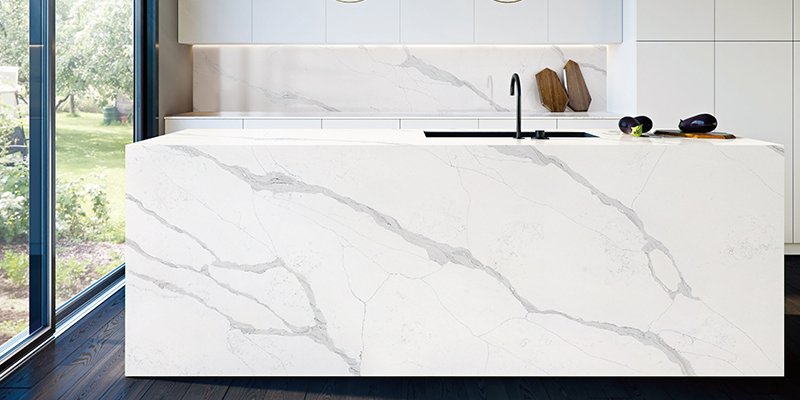
A few years ago, a client for a community center project asked me about Kosher certification. I learned that for a kitchen to be certified Kosher, the countertops must be non-absorbent. This is because Jewish dietary laws require complete separation of meat and dairy. A porous surface could trap food particles, making this separation impossible. Quartz, being engineered to be non-porous, is an ideal material. The certification itself comes from a rabbinic authority that inspects the product to ensure it meets these requirements. This is a great example of a niche certification that is essential for certain projects. While we produce for a global market, we also pay attention to these specific needs. It's our job to provide solutions that respect our clients' cultural and religious practices.
Understanding Niche Certifications
| Certification | What It Signifies | Common Project Type |
|---|---|---|
| Kosher | Material is non-absorbent and suitable for use in kosher kitchens. | Community centers, religious institutions, private homes. |
| GREENGUARD Gold | Product has very low chemical emissions, contributing to healthier indoor air. | Schools, healthcare facilities, LEED-certified buildings. |
| Declare Label | Provides a transparent list of all ingredients in a product. | Projects focused on material health and sustainability. |
| Halal | Similar to Kosher, ensures surfaces are non-porous and easy to clean for ritual purity. | Commercial kitchens serving Halal food, projects in Muslim communities. |
What are the three basic levels of quartz?
Quartz slabs come in different price tiers. So, how do you know if you are paying for better quality or just for a more complex pattern? I can help you understand the levels.
The three basic levels of quartz are builder-grade, mid-grade, and designer-grade. These levels refer to the product's appearance, not its structural quality. They differ in color clarity, pattern complexity, and veining. All levels should have the same high durability.
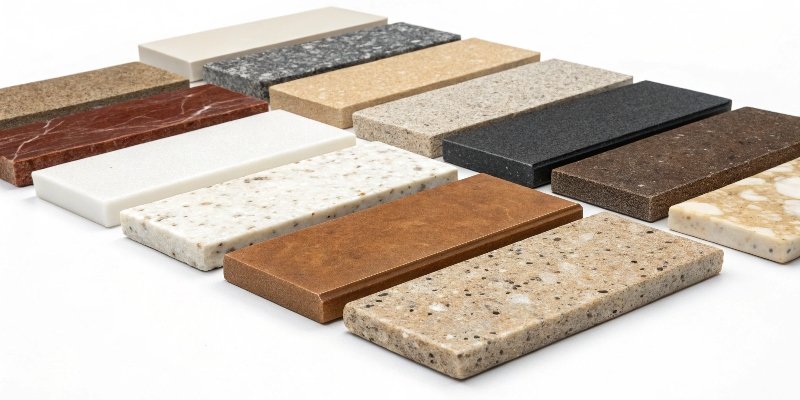
This is a question I get all the time. Many procurement managers worry that a lower-priced quartz is a lower-quality quartz. With a reputable manufacturer, that is not the case. The core quality—the ratio of quartz to resin, the durability, the non-porosity—should be the same across all levels. The price difference comes from the aesthetics. Builder-grade quartz usually has simple, solid colors or fine patterns. Mid-grade introduces more movement and subtle veining. Designer-grade quartz is where you find the stunning, dramatic designs that mimic rare marble or granite. Creating these complex patterns requires more advanced technology and artistry, which is why they cost more. So, when you choose a level, you are making a design decision, not a quality one.
Comparing Quartz Levels by Aesthetics
| Level | Characteristics | Common Applications | Price Point |
|---|---|---|---|
| Builder-Grade | Solid colors, simple patterns, limited color palette. | Large-scale projects, rental properties, budget-conscious renovations. | $ |
| Mid-Grade | More movement, some veining, wider color selection. | Most residential kitchens, standard commercial projects. | $$ |
| Designer-Grade | Complex veining, rich colors, mimic natural stone. | High-end homes, luxury hotels, feature walls, statement islands. | $$$ |
Conclusion
Choosing certified quartz ensures your project's safety, compliance, and longevity. Focus on key certifications like NSF, GREENGUARD, and CE to guarantee success and client satisfaction in any commercial space.



